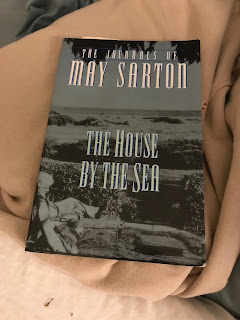 |
| photo by Amy Brandon |
I've always thought a body would have to be sick and dying before they saw the Lord. And I imagined that when He came it would be like looking at the Baptist window: pretty as colored glass with the sun pouring through, such a shine you don't know it's getting dark...But I'll wager it never happens. I'll wager at the very end a body realizes the Lord has already shown Himself. That things just as they are, just what they've always seen, was seeing Him. As for me, I could leave the world with today in my eyes." ~Sook in Truman Capote's "A Christmas Memory"
I haven't liked Christmas for a very long time. Christmas is my husband's favorite holiday. You can see the problem here. I haven't liked Christmas since my family and I put up the Christmas tree to surprise my brother when he came home from his date one Saturday night 29 years ago, and he never came home. That kind of trauma can put you right off a Christmas tree.
When I spent my first Christmas with Ken, I realized I was going to have to work through some issues (a lot of issues, actually, but this post is about Christmas). So I've learned to put up a tree again, and we've started some new traditions. One of them is reading Christmas stories aloud to each other. Our first Christmas together a couple of years ago, he read his favorite to me. This year, it was my turn, so Monday night, sitting by the bonfire and watching the Cold Moon rise, I read to him "A Christmas Memory" by Truman Capote.
"A Christmas Memory" is a heart-warming and heart-wrenching reminiscence of an idyllic time in Capote's childhood right before rectitude and Baptist morality ruin everything. His lyrical and evocative language carries me away to a place and time lost to both him and me. The story is of the beginning of the Christmas season for Capote and his cousin, Sook. (Her name is not mentioned in this story but is in another of his stories called "One Christmas.") Sook, though sixty-something to his seven, is Capote's best childhood friend. They live together, along with various other adult cousins he satrically dubs "Those Who Know Best." Because Sook is different: naive, child-like, and simple, Those Who Know Best treat her with dismissive disdain, but her depth of feeling and understanding far outshine those who have her in their charge.
After a perfectly innocent and natural incident with some whisky leftover from making fruitcake, Those Who Know Best swoop in and impose the arc of their moral will on Capote and Sook, and nothing is ever the same again. A story that is both beautiful and sad may not seem like the best kind of Christmas story to some, but it is perfect for me. It is perfect for all of us for whom Christmas is both beautiful and sad, we the broken living who realize how closely intertwined beauty and sadness are and who have come to know intimately that not only does the one not preclude the other, but also to know that there is a certain kind of beauty that grows only out of sadness.














